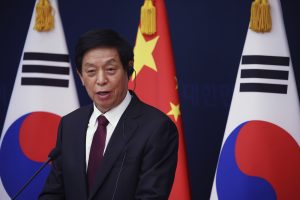China’s top legislator was set to meet new South Korean President Yoon Suk Yeol in Seoul on Friday, as Yoon’s push to buttress a military alliance with Washington has caused concerns that it could hamper Seoul’s ties with Beijing.
Li Zhanshu, third in the Chinese Communist Party hierarchy and one of President Xi Jinping’s closest confidants, is the highest-level Chinese official to visit South Korea since his predecessor came here in 2015. Li’s trip is seen as part of Beijing’s efforts to boost ties with neighboring countries ahead of a Communist Party congress next month that will likely grant Xi a third five-year term as leader.
Li’s visit is also crucial for Yoon’s government as it wants to assure Beijing that its push to reinforce the U.S. alliance and participation in U.S.-led regional initiatives won’t target China, its biggest trading partner.
Li, chairman of the standing committee of China’s National People’s Congress, heads a 66-member Chinese delegation to South Korea that includes three Cabinet-level officials. On Friday afternoon, he is to meet Yoon after separate talks with National Assembly Speaker Kim Jin Pyo and other South Korean parliamentary leaders on cooperation between the two countries’ legislatures.
Li’s closeness to Xi suggests his comments reflect the thinking of Xi and his inner circle.
Earlier this month, Li visited Russia and made comments decrying sanctions against Russia, underscoring Beijing’s support of Moscow in its war on Ukraine despite claims of neutrality. On Thursday, Xi met Russian President Vladimir Putin on the sidelines of a regional gathering in Uzbekistan, and during the meeting, Putin thanked Xi for his “balanced” approach to the Ukrainian crisis and blasted Washington’s “ugly” policies.
Li’s meeting with Yoon draws keen attention because Yoon last month skipped an in-person meeting with U.S. House Speaker Nancy Pelosi, who traveled to Seoul after a high-stakes trip to Taiwan. Yoon, who was on a vacation, spoke by phone with Pelosi but faced domestic criticism that he intentionally shunned her to not provoke China. Yoon was the only head of state who didn’t meet Pelosi face-to-face during her Asian trip that also included Singapore, Malaysia and Japan.
Kim Heung-kyu, director of the U.S.-China Policy Institute at Ajou University in South Korea, said Li’s visit has a different nature from Pelosi’s because she came here after the contentious Taiwan trip. But he said China would still likely see the symbolic significance in Li meeting a South Korean president whom Pelosi failed to meet.
Key topics for discussions during Li’s visit will likely be Seoul’s plans to ensure a more stable operation of a U.S. missile defense system in South Korea which China views as a security threat; a Chinese role in curbing North Korean nuclear threats: and how to promote stable supply chains, some experts say.
South Korea and China will likely reaffirm their respective positions on those issues, with Li expected to relay Chinese positions on them in a clear manner, said Professor Kim Han-kwon at the Korea National Diplomatic Academy.
There are worries that Yoon’s tilt toward Washington could trigger economic retaliation by China as it did when South Korea in 2017 allowed the United States to place the Terminal High-Altitude Area Defense system, or THAAD, on its soil. China, which says its radar system can spy on its territory, suspended group tours to South Korea and conducted an unofficial boycott of South Korean products.
Kim, the academy professor, said China would be more cautious this time because launching such economic retaliations won’t give China what it wants, would push South Korea closer to the United States and would worsen anti-Chinese sentiments in South Korea.
“In the case of the THAAD disputes, China shook public opinions in South Korea and had South Korea suffer economic losses,” he said. “But eventually, they failed to get the THAAD scrapped and anti-China sentiments grew in South Korea. There was also public reevaluation about boosting the Korea-U.S. alliance and a South Korea-U.S.-Japan security cooperation.”
The normal operation of the THAAD base in southern South Korea has been undermined due to local protests trying to block the entry of materials and equipment to the installation. China recently claimed South Korea had agreed to limit the base’s operation, which Yoon’s government has denied.
South Korea, the world’s 10th-largest economy, is a major supplier of semiconductors, automobiles, smartphones and other electronic products. This would make it an attractive partner to both the United States and China, some experts say.
“South Korea has a very important strategic status for both the U.S. and China, like a linchpin for them,” said Kim, the institute director. “Unless the Yoon Suk Yeol government openly pursues an anti-China policy, China will likely further stress a message of amity and cooperation to South Korea, rather than pressures, conflicts and confrontations.”
Cooperative relations with China are essential for Seoul and Washington’s hopes to convince North Korea to give up its nuclear program. While there are questions about how much influence China has on North Korea, it’s still believed to have the greatest leverage over Pyongyang among regional powers because it’s North Korea’s last major diplomatic ally and main economic pipeline.
From a Chinese strategic viewpoint, some observers say North Korea’s traditional role as a bulwark against U.S. influence on the Korean Peninsula has increased amid the protracted China-U.S. competition. In May, China and Russia vetoed a U.S.-led attempt to impose new sanctions on North Korea at the U.N. Security Council over its missile tests this year.
































